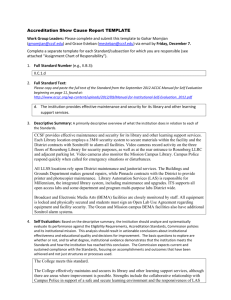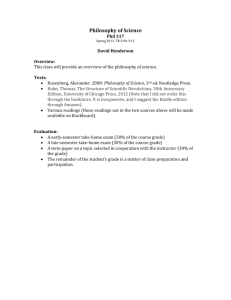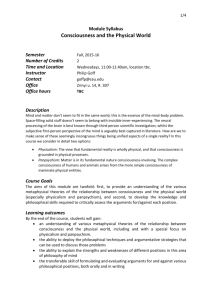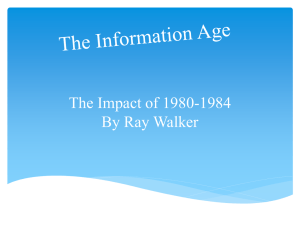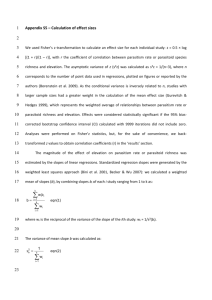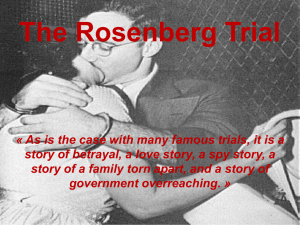Panexperientialism - Claremont McKenna College
advertisement
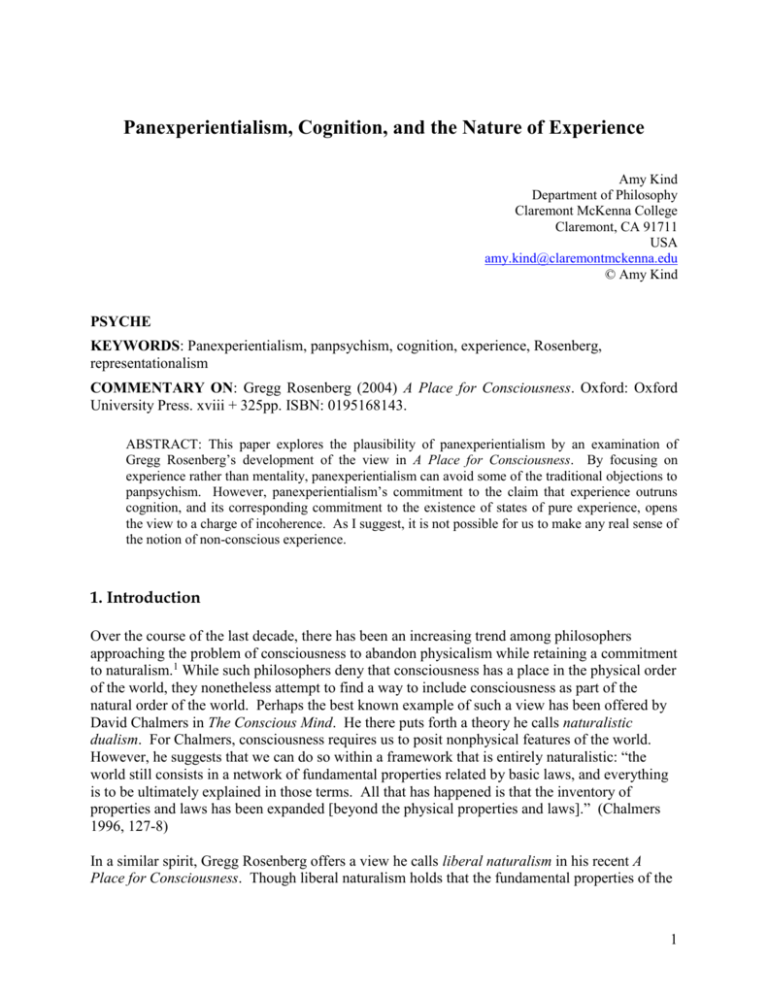
Panexperientialism, Cognition, and the Nature of Experience Amy Kind Department of Philosophy Claremont McKenna College Claremont, CA 91711 USA amy.kind@claremontmckenna.edu © Amy Kind PSYCHE KEYWORDS: Panexperientialism, panpsychism, cognition, experience, Rosenberg, representationalism COMMENTARY ON: Gregg Rosenberg (2004) A Place for Consciousness. Oxford: Oxford University Press. xviii + 325pp. ISBN: 0195168143. ABSTRACT: This paper explores the plausibility of panexperientialism by an examination of Gregg Rosenberg’s development of the view in A Place for Consciousness. By focusing on experience rather than mentality, panexperientialism can avoid some of the traditional objections to panpsychism. However, panexperientialism’s commitment to the claim that experience outruns cognition, and its corresponding commitment to the existence of states of pure experience, opens the view to a charge of incoherence. As I suggest, it is not possible for us to make any real sense of the notion of non-conscious experience. 1. Introduction Over the course of the last decade, there has been an increasing trend among philosophers approaching the problem of consciousness to abandon physicalism while retaining a commitment to naturalism.1 While such philosophers deny that consciousness has a place in the physical order of the world, they nonetheless attempt to find a way to include consciousness as part of the natural order of the world. Perhaps the best known example of such a view has been offered by David Chalmers in The Conscious Mind. He there puts forth a theory he calls naturalistic dualism. For Chalmers, consciousness requires us to posit nonphysical features of the world. However, he suggests that we can do so within a framework that is entirely naturalistic: “the world still consists in a network of fundamental properties related by basic laws, and everything is to be ultimately explained in those terms. All that has happened is that the inventory of properties and laws has been expanded [beyond the physical properties and laws].” (Chalmers 1996, 127-8) In a similar spirit, Gregg Rosenberg offers a view he calls liberal naturalism in his recent A Place for Consciousness. Though liberal naturalism holds that the fundamental properties of the 1 world “are mutually related in a coherent and natural way by a single set of fundamental laws,” it denies that these properties and laws can all be completely captured in physical terms. (Rosenberg 2004, 9) As Rosenberg puts it: The Liberal Naturalists recognize the possibility that the specifications of physics and what could subsist in a world wholly portrayed by physics may not circumscribe nature’s limits. That allows the Liberal Naturalist to step comfortably outside the standard physicalist ontology while retaining a naturalist outlook. (Rosenberg 2004, 9) In discarding this standard ontology, however, non-physicalistic naturalism typically leads in a direction that many have thought problematic. Once you claim that the world contains fundamental features that are non-physical, it is hard to find a principled way of limiting exactly where those fundamental features are found.2 Thus, we seem faced with some version of panpsychism, roughly speaking, the view that everything has a mind. Though Chalmers remains agnostic on whether panpsychism is true, he recognizes that it coheres very nicely with his naturalistic dualism: “if experience is truly a fundamental property, it seems natural for it to be widespread.” (Chalmers 1996, 297) For Chalmers, panpsychism provides a particularly elegant way of working out the details of the view that experience supervenes naturally on the physical. But, that said, he stresses that there are other ways that those details might work out: “Panpsychism is not required for a fundamental theory; it is not written in stone that fundamental properties have to be ubiquitous.” (Chalmers 1997, 417)3 Rosenberg, in contrast, is less sanguine that we can avoid some form of panpsychism. Though he argues that liberal naturalism does not require that we accept panpsychism in its traditional form, he believes that we will likely have to embrace what he takes to be a milder or diluted version of the view that he calls panexperientialism. Panexperientialism claims that “experience exists throughout nature and that mentality (i.e., a thing requiring cognition, functionally construed) is not essential to it.” (Rosenberg 2004, 91) Rosenberg defends liberal naturalism by attempting to show that we have much less to fear from panexperientialism than we might have thought. Moreover, he suggests that we have independent reasons to believe not only that panexperientialism is possible, but that it is probable. In what follows, I explore the coherence of the panexperientialist hypothesis by a careful examination of Rosenberg’s arguments. In evaluating the coherence of panexperientialism, it will be especially important to get clear on exactly what the view claims and exactly how it departs from panpsychism in its traditional form. This is the project of section 2. In section 3, I consider Rosenberg’s case for the possibility of panexperientialism. This case proceeds primarily by defending the view against two objections. Though I believe that Rosenberg may well be able to answer the two objections that he considers, reflection upon these objections reveals a third, related objection that Rosenberg does not consider. I discuss this objection in section 4. Ultimately, I conclude that this objection proves fatal to the coherence of panexperientialism. 2 2. What is Panexperientialism? There is a long tradition of panpsychist thinking in Western philosophy. In a recent survey of panpsychism, William Seager and Sean Allen-Hermanson argue that the doctrine of panpsychism is so old that “its origins long precede any records of systematic philosophy.” (Seager and Allen-Hermanson 2005; see also Skrbina 2003, 6) Many influential philosophers throughout history were committed to panpsychism. For example, among the presocratic philosophers, both Thales and Anaxagoras can be read as endorsing forms of panpsychism. One can also at least arguably find suggestions of panpsychism in the works of both Plato and Aristotle.4 Panpsychism flourished during the 16th century among philosophers of the Italian renaissance, and two of the great philosophers of the 17th century, Spinoza and Leibniz, are generally viewed as offering panpsychist theories. In the late 19th and early 20th century, panpsychism can be found in the works of James, Bergson and Whitehead.5 Despite its long history, however, panpsychism has largely fallen out of favor in the late 20th and early 21st century. Most contemporary philosophers regard it with skepticism, if not outright scorn and even ridicule. Colin McGinn, for example, has claimed that panpsychism is “metaphysically and scientifically outrageous.” (McGinn 1982, 34.) Similarly, in reaction to Chalmers’ panpsychist musings, John Searle calls panpsychism “absurd” and claims that there is “not the slightest reason” to adopt it. (Searle 1997, 161) Rosenberg thus faces an uphill battle in his attempt to resurrect and rehabilitate panpsychism, even panpsychism in an attenuated panexperientialist form. To evaluate whether he succeeds in his attempt, however, we need to get clear on exactly what panexperientialism is. This in turn requires that we get clearer on exactly what panpsychism is. Just as we typically view certain physical properties (such as mass, charge and spin) to be fundamental properties of the universe, panpsychists typically view certain mental properties to be fundamental properties of the universe. Exactly which mental properties are to be seen as fundamental varies among panpsychist theories, but the properties most often invoked include consciousness, emotion, and thought, among others.6 In claiming that these mental properties are fundamental, the panpsychist claims that they are found throughout the universe, i.e., that all things have mentality. But how we are to understand the notion of “all things” also varies among panpsychist theories. One strand of panpsychism claims that only some existing things are genuine individuals; everything else is an aggregate.7 Mentality is then associated only with the genuine individuals. Another strand of panpsychism, however, interprets “all things” quite literally, attributing mentality to everything that exists, from subatomic particles to atoms to rocks.8 With panpsychism thus specified, one might immediately be sympathetic to McGinn and Searle’s claims of outrageousness and absurdity. After all, not only do we fail to have any evidence that atoms or rocks have mental states, but it is also difficult to know how even to make sense of the claim that such things have minds. Does panexperientialism fare any better? Insofar as it makes a narrower claim than panpsychism, we might expect it to have a better chance at deflecting some of the contemporary criticism. Rather than claiming that everything 3 has a mind, or even that everything has some species of mentality, the panexperientialist claims only that everything has experience. David Ray Griffin, who first introduced the term “panexperientialism,” develops the view in process philosophy terms. Influenced by the work of Whitehead, Griffin focuses primarily on events – his panexperientialist view sees the world as composed of momentary events that, despite being wholly physical, are nonetheless experiential. Like Griffin, Rosenberg is also influenced by Whitehead’s process philosophy.9 Rosenberg agrees with Griffin that it is experience and not some broader class of mental properties that we find throughout nature. The key panexperientialist move is thus to divorce the existence of experience from the existence of mentality, or more specifically, from the existence of cognition. The fact that Rosenberg endorses panexperientialism, rather than panpsychism, is a direct consequence of his liberal naturalism. Recall that on this view, experience is posited to be a fundamental feature of the world. As such, we can expect it to occur throughout nature. Since the liberal naturalist does not also see cognition as a fundamental feature of the world, there is no special reason for the theory to postulate the existence of cognition throughout nature. Doing so would be warranted only if we were to assume that experience cannot occur except in the context of cognition. For the liberal naturalist, however, this assumption would be ad hoc. To see this, it will be useful to examine the conservative methodological principles which constrain liberal naturalism. Rosenberg argues persuasively that the physicalist is committed to maintaining a conservative ontological framework. The core principle underlying physicalism is the claim that we can give a complete explanation of the world in solely physical terms. As Rosenberg notes: “Physicalism makes a very powerful claim with respect to its ontology. Physicalism asserts a closure condition, saying that a true, complete, and exceptionless theory of the physical tells us all there is to know about the fundamental nature of our world.” (Rosenberg 2004, 32) The problem for physicalism, then, is to find some way of accommodating all of the things which the world seems to contain that fall outside of the domain of physics – things ranging from tables and telephones to tastes and tingles. Since none of these things falls explicitly within the ontology of physics, they pose a basic challenge for the physicalist. Some of these things can be handled easily – the physicalist can adopt certain principles to show how they can be derived from its fundamental ontology. But other things – in particular, things relating to consciousness – cannot be handled so easily. Thus, to satisfy its ontological constraints, the physicalist is forced to be methodologically radical.10 In contrast to the physicalist, the liberal naturalist is committed to maintaining a conservative methodological framework, aiming to “explain consciousness clearly, without appealing to anomalous standards of explanation.” (Rosenberg 2004, 77) As Rosenberg notes: Liberal Naturalism has weaker metaphysical commitments than physicalism because its primary allegiance is to the empirical project of explanation. One might suggest that Liberal Naturalism is metaphysics in the service of explanation, whereas physicalism is explanation in service to metaphysics. (Rosenberg 2004, 78) 4 Freed of the constraints placed upon us by a commitment to the conservative ontology of physicalism, the liberal naturalist has available to him heretofore untenable explanatory hypotheses, and he decides among them simply on pretheoretic grounds of explanatory force. By sacrificing ontological conservatism, he is able to maintain methodological conservatism, and this combination leads to his central claim – experience should be treated as an extraphysical fundamental property of the world. In treating experience as fundamental, the liberal naturalist also has to introduce new, extraphysical fundamental laws to govern the experiential realm and its relation to the physical realm. Unsurprisingly, this too proceeds without building in any ontological assumptions; all that guides the liberal naturalist is his commitment to sound methodological principles. According to Rosenberg, this way of proceeding leads us to a view according to which experience outruns cognition. In short, once we adopt certain plausible principles about the nature of fundamental laws – principles concerning simplicity, clarity, objectivity and elegance – Rosenberg thinks that the “simplest and most fruitful theory” of these laws entails panexperientialism.11 It should now be clear why Rosenberg adopts panexperientialism in particular rather than panpsychism in general. Though he sees panexperientialism as less ontologically radical – or “milder” – than panpsychism (Rosenberg 2004, 91),12 his defense of panexperientialism is not driven by a desire for mildness. Rather, he defends panexperientialism because it is the view that he believes will most likely be justified by the adoption of sound methodological practice. This turns out to be important, because it is not clear to me that we should view panexperientialism as in any important sense milder than panpsychism. Certainly, it is true that panexperientialism makes a more limited claim than panpsychism; as we have seen, it limits itself to experience, rather than “full-blown” mentality. And given the scarcity of the evidence that full-blown mentality occurs throughout nature, it might be thought that the panexperientialist decreases his argumentative burden when he retreats to a claim for which he would have to find less evidence. But, as we will see, in divorcing experience from cognition, panexperientialism opens itself to some charges of unintelligibility that are not faced by panpsychism. As I will suggest, the commitments of panexperientialism are in important ways even more troubling than the commitments of panpsychism. First, however, I want to discuss Rosenberg’s defense of panexperientialism, and in particular, his responses to two objections that he thinks the view faces. 3. Two Objections to Panexperientialism According to Rosenberg, there are two serious intuitive reasons for rejecting panexperientialism outright: (1) we have no evidence for the existence of experience in the absence of cognition; (2) the view is incoherent since separating experience from cognition requires the existence of experiences independent of appropriate experiencers. Unsurprisingly, Rosenberg believes that neither of these objections to panexperientialism can hold up under close scrutiny. 5 Before we evaluate Rosenberg’s assessment of these objections, however, it will be useful to take note of something that these two objections have in common. Both of them arise specifically from Rosenberg’s focus on experience, rather than on mentality in some more generic sense. The panpsychist who is not a panexperientialist need not claim that experience outruns cognition; thus, objection (1) need not apply to her view. Likewise, insofar as the nonpanexperientialist panpsychist commits herself to the existence of minds throughout the universe, she can avoid the charge that we have subjectless experiences. For the panpsychist, each experience can be said to belong to the mind in which it occurs. Thus, objection (2) need not apply to her either. In considering only the two objections that he does, then, Rosenberg’s discussion is importantly incomplete. Granted, as we have already suggested, by limiting his thesis to a claim about the ubiquity of experience rather than the ubiquity of full-blown mentality, he may be able to avoid some of the standard objections to panpsychism. The question remains, however, whether he can avoid all of the standard objections to panpsychism.13 On the face of it, it seems that at least some of the important objections to panpsychism apply to panexperientialism as well. I’ll briefly mention two of them here: (1) First there is the charge that panpsychism, while perhaps not strictly speaking false, is meaningless.14 Consider an atom. The panpsychist does not have a different view of the internal (physical) constitution of the atom from the rest of us. He does not differ from us in his view of the behavior of the atom. The panpsychist thus seems to agree with the rest of us on all the relevant facts about the atom but nonetheless chooses to call the atom conscious. As such, his claim does not seem to assert anything meaningful – he is simply choosing to use the word “conscious” in a way different from the rest of us. This criticism is in the spirit of some of Wittgensteinian’s remarks in the Philosophical Investigations: “Could one imagine a stone’s having consciousness? And if anyone can do so—why should that not merely prove that such image-mongery is of no interest to us?” (Wittgenstein 1958, 119). A similar point could be addressed to the panexperientialist with respect to the word “experience.” (2) Second, there is an objection we might call the combination problem. Consider the following passage from James: Take a sentence of a dozen words, and take twelve men and tell to each one word. Then stand the men in a row or jam them in a bunch, and let each of them think of his word as intently as he will; nowhere will there be a consciousness of the whole sentence. … Where the elemental units are supposed to be feelings, the case is in no wise altered. Take a hundred of them, shuffle them, and pack them together as close as you can (whatever that might mean); still each remains the same feeling it always was, shut in its own skin, windowless, ignorant of what the other feelings are and mean. (James 1890/1950, 160) If panpsychism can’t explain how our full-fledged consciousness arises from the elemental bits of consciousness, then it doesn’t seem to fare any better than standard physicalist views with 6 respect to the hard problem of consciousness. Panexperientialism does no better than standard panpsychist views in answering this objection. Insofar as his discussion does not focus on these (or other) standard objections to panpsychism, he seems to have engaged himself in an internal debate among panpsychists, and doing so leaves some important questions unanswered. An analogy might be useful here. Consider epiphenomenalist dualism. This view avoids an influential objection that is often raised to dualism, namely, that it violates the causal closure of the physical. But in avoiding this objection the epiphenomal dualist opens herself up to a different objection; she will have to defend her view against the charge that it is implausible to deny the reality of mental causation. Let’s suppose she is able to answer this objection – that she convinces us we should not be troubled by the fact that her view deprives the mental of its causal efficacy. This alone, of course, would not be enough to convince us to adopt epiphenomenal dualism. It might be enough to convince the dualist that he should embrace epiphenomenalism rather than, say, interactionism – or to convince us that if we were to adopt dualism we would be best off adopting epiphenomenal dualism. But more work needs to be done to establish dualism in the first place. Likewise, what Rosenberg is doing might convince us of a similar conditional claim: if we were to adopt some form of panpsychism, we would be best off adopting panexperientialism. But more work would need to be done to defend panpsychism in the first place. I will return to the issue about the comparative plausibility of panexperientialism and panpsychism after considering the objections that Rosenberg does consider. 3.1. Objection One: No Evidentiary Basis How seriously should we take the worry that we have no evidence for the existence of experience outside of cognitive contexts? According to Rosenberg, not very seriously. As he argues: [E]very theory about consciousness goes beyond the direct evidence that we have, because we have direct evidence only in our own cases. From my own perspective, any theory that attributes consciousness to people other than myself is going beyond my evidence for the existence of consciousness. More generally, what I count as evidence for attributing consciousness beyond my own case will depend on my theory of consciousness. Therefore, the concept of going beyond the evidence is poorly defined. (Rosenberg 2004, 92-3) It is hard to believe, however, that the proponent of Objection One is going to find this response at all satisfying. Probably, the proponent will admit that we have direct evidence for consciousness only in our own case, but deny that this means that theories that attribute consciousness to others goes beyond the evidence. Our total evidence includes more than just our direct evidence. That said, I do think that Rosenberg can produce a more satisfying answer to this objection. To my mind, he should accept that, at present, there are no facts about rocks or tress or atoms or 7 molecules that he can point to as evidence that they have experience. Rather, he is attributing experience to them because it is a consequence of a theory that we have independent reasons for accepting, namely, that is has more explanatory power than other available theories. This is entirely in line with scientific practice. Scientists typically postulate the existence of new entities in the absence of direct evidence for them precisely because such entities are demanded by a theory. This is, after all, why we call them theoretical entities. 3.2. Objection Two: Incoherence Rosenberg takes more seriously the worry that there is something incoherent about panexperientialism – that the notion of experience without cognition is somehow unintelligible. To defuse this objection, Rosenberg attempts to show us that the open-endedness of our concept of experience allows us to stretch it to apply to noncognitive systems. First, it is clear that we already accept the existence of experiences that are quite different from our own, so different, in fact, that they are unimaginable from the human point of view. The experiences of a bat navigating by echolocation, for example, or those of a hammerhead shark using its electromagnetic sense to detect prey are completely alien to us. Second, given our willingness to attribute experiences to organisms much simpler than we are, it is also clear that we already accept the existence of experiences far simpler than our own. Thus, the mere fact that noncognitive experiences would likely be both alien to us and far simpler than our own experiences cannot itself show that there is something incoherent about the supposition that they exist. Most likely, our inability to make sense of the notion of noncognitive experiences stems at least in part from our inability to separate our own experiences from the cognitive context in which they occur. But the fact that our experiences are inextricably intertwined with cognition does not show that all experiences must be inextricably intertwined with cognition. According to Rosenberg, we should stop trying to think of these noncognitive experiences as “little pains” or “little specks of blue” (Rosenberg 2004, 94). Rather than trying to model the experience of a noncognitive system on the analogy of our own experience, the panexperientialist instead attributes to such a system “experience that has a character in some very abstract sense like that of our experiences but specifically unimaginable to us and unlike our own qualia.” (Rosenberg 2004, 95) Such experiences are best thought of as protoconscious, rather than conscious, since they occur without any associated cognition.15 They are states of pure experience, without any semantic or cognitive content. Having offered these considerations, Rosenberg claims that the sense of incoherence associated with panexperientialism should begin to dissipate. (Insofar as it remains, we are most likely guilty of “cognitive rigidity.”)16 However, there is one further challenge that he believes he must take up, namely, the challenge of representationalism. An increasingly popular view among philosophers of mind, representationalism claims that phenomenal content supervenes on intentional content. Many representationalists go further, claiming that phenomenal content reduces to intentional content. But even representationalism in its weaker form poses a problem for the panexperientialist. A state of pure experience will lack representational content, and thus, 8 according to the representationalist, will lack phenomenal content. Without phenomenal content, it is hard to see how such a state could be an experience in any real sense of the term. In response to the representationalist challenge, Rosenberg’s principal strategy is to argue for the falsity of representationalism.17 Here he relies heavily on considerations stemming from synesthesia – a syndrome in which individuals have atypical, cross-modal phenomenal experiences. Most commonly, numbers or letters are seen by synesthetes to have certain colors – for example, the number 2 might be seen as being green, and the letter “B” might be seen as yellow.18 According to Rosenberg, synesthesia presents a counterexample to representationalism. First, the synesthetes’ reports of their own experiences “are very strong indicators that a given representational content … can yield different phenomenal contents….” (Rosenberg 2004, 101) Second, these same reports suggest that in at least some cases the phenomenal content of a synesthetic experience will outrun the representational content. Thus, phenomenal content does not even supervene on representational content, let alone reduce to it, and representationalism must be false. Let’s call this the argument from synesthesia. Now I myself am no friend of representationalism, and I have argued against it in previous work. (See Kind 2003; forthcoming) But it seems to me that the representationalist will undoubtedly have the means at her disposal at the very least to parry these considerations, if not answer them completely. In developing his case for the argument from synesthesia, Rosenberg proceeds primarily by citing the testimony of synesthetes about their experiences. To my mind, however, it is by no means easy to make sense of the synesthetic testimony. Moreover, there is a lot more out there than Rosenberg cites, and it is not clear that all the testimony is consistent. At the very least, the available testimony is subject to interpretation. Perhaps under the interpretation which Rosenberg provides, synesthesia poses a challenge to representationalism. But even if it does (and I should say that even this is not clear), it is nonetheless quite likely that the representationalist can mine this testimony for a competing interpretation that fits the synesthetes’ testimony at least as well as Rosenberg’s interpretation and yet is completely compatible with her theory.19 At best, the representationalist will be able to answer the challenge; at worst, there will be a stand-off. Of course, I recognize that what I’ve said here cannot be fully persuasive. In order to do any real justice to Rosenberg’s argument from synesthesia, we would have to look much more closely at the testimony of the synesthetes and the plausibility of the competing interpretations of such testimony that Rosenberg and the representationalists will provide. However, I do not think the intricacies of this debate need concern us here. To defend panexperientialism, Rosenberg needs to show that representationalism is false. But as long as there are other considerations that he could invoke to argue against representationalism – and I think there are some compelling ones – the failure of the argument from synesthesia will not matter for the defense of panexperientialism. More importantly, however, I want to avoid wading further into a debate about the argument from synesthesia because I think the focus on representationalism is something of a red herring. Yes, the truth of representationalism would pose a challenge to panexperientialism. But lurking in the background of the discussion of representationalism lies another objection to the coherence of panexperientialism that Rosenberg fails to consider. This challenge is both deeper 9 and more significant, since it would remain even if representationalism could be shown to be false. In short, we need to determine whether we can make sense of a state of “pure experience.” 4. Incoherence, Revisited Recall that, for Rosenberg, in noncognitive systems, experience is best thought of as protoconscious, rather than as conscious. This term is meant “to suggest the hypothesized kinship between the quality of experience for noncognitive systems and our own experiences and also the alienation from its richness, variety, semantic significance, and cognitive awareness.” (Rosenberg 2004, 96). Recall also that Rosenberg urges us to stop trying to think of these noncognitive experiences as “little pains” or “little specks of blue.” Once we do so, we will see that: As a dilution of traditional panpsychism, the panexperientialism we end up with may be as benign as would occur if the interactions between very simple atoms or molecules mainly produced flashes of extraordinarily simple and brief feeling, like fireflies quietly flickering in the night. (Rosenberg 2004, 96) Rosenberg thus believes that the considerations he has put forward support panexperientialism in two ways. First, as we noted earlier, they aim to erode the sense of incoherence associated with panexperientialism. Second, they are supposed to help us to see that panexperientialism is less counterintuitive than we might have originally thought, particularly in comparison with a more general form of panpsychism. To my mind, however, the considerations that he advances do neither of these things. In fact, once we have a clear understanding of panexperientialism before us, I believe that it may well be more counterintuitive than traditional panpsychism. To see this, we need to think some more about Rosenberg’s conception of experience. In short, on his view experience should be not be equated with consciousness, for the former can exist without the latter. There might, in other words, exist some experience that is “too simple to support anything worthy of the name ‘consciousness.’” (Rosenberg 2004, 248)20 It’s important to be very clear about what Rosenberg is saying here, and about how radical a claim it is. Perhaps it does not sound particularly counterintuitive to talk of unconscious experience, because we already accept that there exist experiences of which we are not aware (e.g., the case of the long distance truck driver, who is presumably having all sorts of experiences as he drives which he does not notice while he is having them). But insofar as we talk of experiences being conscious and unconscious in this sense, we do not seem to be talking about experiences that lack phenomenal consciousness. In Ned Block’s sense, such states are pconscious even if they are not a-conscious. (Block 1995) What Rosenberg wants to claim, however, is that there can be states of experience that are not even p-conscious. We humans cannot have such experiences – since our experiences always occur in the context of a cognitive network, our experiences always have the phenomenal character of consciousness. But experiences which occur outside of a cognitive network will lack this character. Noncognitive systems thus have experiences without having consciousness. 10 But can we really get a handle on this notion of nonconscious experience? Can we make sense of this idea of pure experience – experience occurring in the absence of any cognition, and hence in the absence of any consciousness? How could there be a subject of such an experience? This, I think, is the real worry that faces panexperientialism, a worry that runs deeper than the worry about representationalism. First, let’s note that in order for something to be an experience, it must be experienced by someone or something. In other words, for each experience there must be a subject of experience. The fact that the experience is nonconscious shouldn’t change this basic fact. There cannot be freefloating conscious experiences – there are no freefloating pains or freefloating itches. We can’t make sense of a pain or an itch that floats free of any subject. Likewise, there cannot be freefloating nonconscious experiences. However alien these experiences are from our own, in order for them to be experiences, they must be experienced by some subject. I believe that Rosenberg would agree with this conceptual point. He notes at one point that “It is highly implausible, for example, that kinds of pain could exist for which there is no subject to experience them.” (Rosenberg 2004, 243) In fact, it turns out to be crucial for the development of his liberal naturalism (for reasons that I do not have the space to go into here) that phenomenal qualities could not exist unless some subject was experiencing them and that experiences could not exist unless they were experiences of phenomenal qualities. … A phenomenal quality is an object of experience that should not be identified with the experiencing of it. And an individual experiencer is a subject of qualitative experience that should not be identified with its objects. (Rosenberg 2004, 243) But without consciousness, how can we make sense of the notion that there is a subject of experience? Recall Rosenberg’s own description (quoted above) of how we might conceive noncognitive experiences: the molecular interactions are said to produce “flashes of extraordinarily simple and brief feeling, like fireflies quietly flickering in the night.” (Rosenberg 2004, 96) Describing the feelings in this way – as instantaneous sparks or flickers that are byproducts of the molecular interaction – encourages a picture of free-floating feelings, dissociated from the particular molecules themselves. And this picture quite clearly collapses into incoherence. Now I do not mean to suggest that this metaphorical description of noncognitive experience commits Rosenberg to the view that such experiences would have to be free-floating and subjectless. But I find it telling that even as Rosenberg is trying to convince us that we can make sense of these noncognitive experiences, he himself paints a picture that does not really make sense. And he does seem to understand that there may be some difficulty here. Following the “firefly” metaphor, he notes the following: Even without a cognitive engine being present, there may be a perfectly good sense in which each feeling or protofeeling is part of a subject of experience. By saying this, I am just pointing out that not all subjects of experience are cognitive (and hence mental) systems. (Rosenberg 2004, 96) 11 But this is all that he says. Rosenberg gives us no real help in understanding how a noncognitive system – a system such as a rock, or an atom, or a neuron – could be a subject of experience.21 And without this help, I remain lost. To think of an experience as pure seems to require that we separate it entirely from context. This leads to a second reason that nonconscious experiences cannot be conceived. When we separate the experience entirely from its context, we seem to be deprived us of any way to conceive of experiential unity. Our own experiences are necessarily unified – the unity of consciousness is a datum for which any theory of consciousness has to account. There are two aspects to this unity – synchronic unity (unity at a time) and diachronic unity (unity over time). I am here interested primarily in the synchronic unity of our experiences. This feature of experience seems to me to derive from experience itself, not from conscious experience, and would thus need to be accounted for in noncognitive experiences as well, however alien they were from our own experiences. Having stripped down noncognitive experiences to the bone, however, Rosenberg seems to strip away a sense in which they form part of a unified field. As such, it is again difficult to conceive of them as experiences at all. Moreover, this difficulty does not seem to arise merely due to cognitive rigidity. I take the two problems I have just raised for panexperientialism – the problem of the subject and the problem of experiential unity – to be two parts of a single problem. Both stem from the same worry – there are facts about the nature of experience that cannot be accounted for in the putative experiences of noncognitive systems. Moreover, though I think this problem for panexperientialism is deeper than the problem posed by representationalism, I do think these two problems are connected as well. In fact, it would be plausible to understand the problem posed by representationalism to be a specific manifestation of the deeper worry I am here raising. We can best see this, in fact, by returning to Rosenberg’s original statement of the second objection that he considers, the one that leads him to start worrying about representationalism. As he states the objection, the mere supposition of panexperientialism is charged to be incoherent “because divorcing experience from cognition requires experiences without appropriate experiencers.” (Rosenberg 2004, 94) Rosenberg takes the worry about “appropriate experiencers” to be a worry about noncognitive experiencers, and whether they would have the resources to support experiences in the absence of cognition. The worry about representationalism is a more specific version of this worry – would noncognitive systems have the resources to support experiences in the absence of intentionality? But one might back up instead and take this worry to be a more general one, about whether there are entities that could properly be called experiencers at all outside of a cognitive context. 5. Concluding Remarks Rosenberg’s overarching project in A Place for Consciousness is to defend his liberal naturalism, a view which has panpsychist consequences. Given the antecedent implausibility of panpsychism, any view which implies it might very naturally be immediately regarded with 12 skepticism. In order to defend his liberal naturalism, then, Rosenberg needs to show that the panpsychism implied by this view – panexperientialism – is not nearly as implausible as we might otherwise have expected. Though he himself admits that he has not established the truth of panexperientialism, he believes that he has shown that the view is possible -- and even probable. Of course, even if he had been able to show that panexperientialism were true, he wouldn’t thereby have established liberal naturalism. He wouldn’t even have established the falsity of physicalism. The ubiquity of experience, after all, is perfectly compatible with physicalism; the ubiquity of a property does not itself show that the property cannot be accounted for within the physical domain. But if the truth of panexperientialism fails to entail either the truth of liberal naturalism or the falsity of physicalism, then a fortiori, the mere possibility – or even probability – of panexperientialism will not do so either. What it would do, however, is to shift the argumentative burden to his opponents. Showing that panexperientialism is a coherent view deprives opponents of liberal naturalism of an easy objection to the view, and forces them to engage the view on its own terms. Unfortunately, however, Rosenberg has not succeeded in showing that panexperientialism is coherent. Moreover, the considerations that I raised above suggest that this cannot be shown. We are thus left with a somewhat counterintuitive conclusion. Oddly enough, limiting the panpsychist consequences of liberal naturalism to panexperientialism makes the view harder, not easier, to defend. As implausible as it might seem to attribute consciousness throughout the universe, it is even more implausible to suppose that we could tease apart experience from consciousness. The suggestion that an atom or even a rock could be conscious seems crazy. But the suggestion that the atom or rock has experiences without having consciousness is not just crazy, it is conceptually incoherent.22 6. References Block, N. 1995. “On a Confusion about a Function of Consciousness.” Behavioral and Brain Sciences 18: 227-247. Chalmers, D. 1996. The Conscious Mind. Oxford University Press. Clarke, D.S. (ed.) 2004. Panpsychism: Past and Recent Selected Readings. State University of New York Press. Cytowic, R. 1998. The Man Who Tasted Shapes. The MIT Press. Edwards, P. 1967. “Panpsychism.” The Encyclopedia of Philosophy, Paul Edwards (ed.) Macmillan Publishing Company. Griffin, D.R. 1997. “Pan-Experientialist Physicalism and the Mind-Body Problem.” Journal of Consciousness Studies 4: 248-268. James, W. 1890/1950. The Principles of Psychology, Vol. 1. Dover Books. 13 Kind, A. Forthcoming. “Restrictions on Representationalism.” To be published in Philosophical Studies. Kind, A. 2003. “What’s So Transparent About Transparency?” Philosophical Studies 115: 225-244. Libet, B. 1996. “Solutions to the Hard Problem of Consciousness.” Journal of Consciousness Studies 3: 33-35. Nagel, T. 1986. The View from Nowhere. Oxford University Press. Nagel, T. 1979. “Panpsychism.” In Mortal Questions. Cambridge University Press. Rosenberg, G. 2004. A Place for Consciousness. Oxford University Press. Rosenberg, G. 1996. “Rethinking Nature: A Hard Problem within the Hard Problem.” Journal of Consciousness Studies 3:76-88. Reprinted in Explaining Consciousness: The Hard Problem, Jonathan Shear (ed.) The MIT Press. Seager, W. and Allen-Hermanson, S. 2005. “Panpsychism.” The Stanford Encyclopedia of Philosophy (Summer 2005 Edition), Edward N. Zalta (ed.), http://plato.stanford.edu/archives/sum2005/entries/panpsychism/ Seager, W. 1995. “Consciousness, Information and Panpsychism.” Journal of Consciousness Studies 2: 272-288. Searle, J. 1997. “Consciousness and the Philosophers.” New York Review of Books. Reprinted in The Mystery of Consciousness. New York Review of Books. Skrbina, D. 2003. “Panpsychism as an Underlying Theme in Western Philosophy.” Journal of Consciousness Studies 10: 4-46. Endnotes For more evidence of this growing antiphysicalist trend, see Chalmers’ online remarks about Jaegwon Kim’s latest book; available at http://fragments.consc.net/djc/2005/09/jaegwon_kim_com.html. 2 For an influential development of the argument that panpsychism follows from nonreductionism coupled with a denial of emergentism, see Nagel (1979). 3 For example, Libet (1996) offers a theory which sees consciousness as fundamental but which does not endorse panpsychism. 4 See Skrbina (2003, 10-11). 5 Edwards (1967) argues that James is not a panpsychist. In contrast, Clarke (2004) and Skrbina (2003) each argue that James came to endorse panpsychism in his later writings despite having rejected it in early works such as The Principles of Psychology. 1 14 6 See Skrbina (2003, 7) for more examples. This interpretation of panpsychism is often associated with Leibniz. Clarke defines panpsychism in a related way, taking the thesis to apply to “all natural bodies with unity of organization.” (Clarke 2004, 5) As he inteprets this claim, it would apply to atoms and molecules but not to rocks or planets. 8 See Skrbina (2003, 8) and Griffin (1997, 254) for further discussion of this point. 9 See Rosenberg (2004, 210; 299). 10 Rosenberg argues that physicalists must take such methodologically radical measures as “blaming theoretical failures on cognitive deficits of the theory makers rather than on the quality of the theories; approving of appeals to unique and not clearly meaningful kinds of necessity; postulating primitive identities; or arguing for the elimination of self-evident observables.” (Rosenberg 2004, p. 77) For further discussion of these physicalist moves, see Rosenberg (2004, 31-76). 11 The quoted phrase is from Rosenberg (2004, 92). Rosenberg’s arguments about the nature of fundamental laws come in (Rosenberg 2004, 104-113). He presents his own theory of these laws in Rosenberg (2004, 230-147). 12 See also Rosenberg (2004, 96) where he claims that panexperientialism is a “dilution of traditional panpsychism.” 13 See Seager and Allen-Hermanson (2005) and Edwards (1967) for discussion of some standard objections to panpsychism. 14 Edwards (1967) has a particularly nice discussion of this objection. 15 What Rosenberg means by “protoconscious” is different from what Chalmers means by “protophenomenal.” See Rosenberg (2004, 97) and Chalmers (1996, 126-127). 16 See Rosenberg (2004, 96). Elsewhere he argues that “the difficulty of imagining qualitative fields that are not associated with minds comes from a shortcoming in our empathy, and not from a fundamental conceptual incoherence.” (Rosenberg 1996, 300) 17 By presenting things this way, I collapse Rosenberg’s Reply 2 with his Reply 3. Strictly speaking, reply 2 focuses on whether representationalism is true for human phenomenal content; whereas reply 3 focuses on whether representationalism, even if true of human phenomenal content, can plausibly be extended to non-human phenomenal content. See Rosenberg (2004, 97-103, esp. 102-103). However, since I take representationalism to be a theory of phenomenal content simpliciter, and not just human phenomenal content, I take both of these replies to have the same basic thrust, namely, that representationalism is false and thus poses no challenge to panexperientialism. I thus treat them together in the text. In the text I also ignore Rosenberg’s reply 1, which suggests that the experiences of noncognitive systems may nonetheless have “inert” representational features. (Rosenberg 2004, 97) In brief, this reply does not seem to me to cohere well with his description of these states as states of “pure experience,” but even if we can make sense of states of pure experience having inert representational features, it is not clear to me that this will satisfy the representationalist. 18 For a comprehensive discussion of synesthesia, see Cytowic (1993). 19 Rosenberg interprets the synesthetes’ testimony as providing cases where there is a difference in phenomenal content without a difference in representational content, e.g., when the synesthete sees the number 2 as green, her experience and mine differ in phenomenal content though both of our experiences have the same representational content. But the representationalist will 7 15 undoubtedly try to interpret the synesthete’s testimony in such a way that there is a difference in representational content between her experience and mine. 20 As an aside, this distinction that Rosenberg draws between experience and consciousness shows that he thinks of the Hard Problem of Consciousness as really consisting of two problems. First there is a general problem of fitting experience into the natural world. Then there is a more specific problem about how, in the context of cognition, experience develops the character of consciousness. See Rosenberg (1996, 289) 21 Granted, Rosenberg need not be committed to the claim that any of these particular systems that I mention (rocks, atoms, neurons) is a subject of experience. But he is committed to the claim that some noncognitive systems are subjects of experience. 22 Earlier versions of this paper were presented at the Southern California Philosophy Conference, California State University at Northridge, and Claremont Graduate University. I thank the audiences there for helpful comments and discussion. 16
